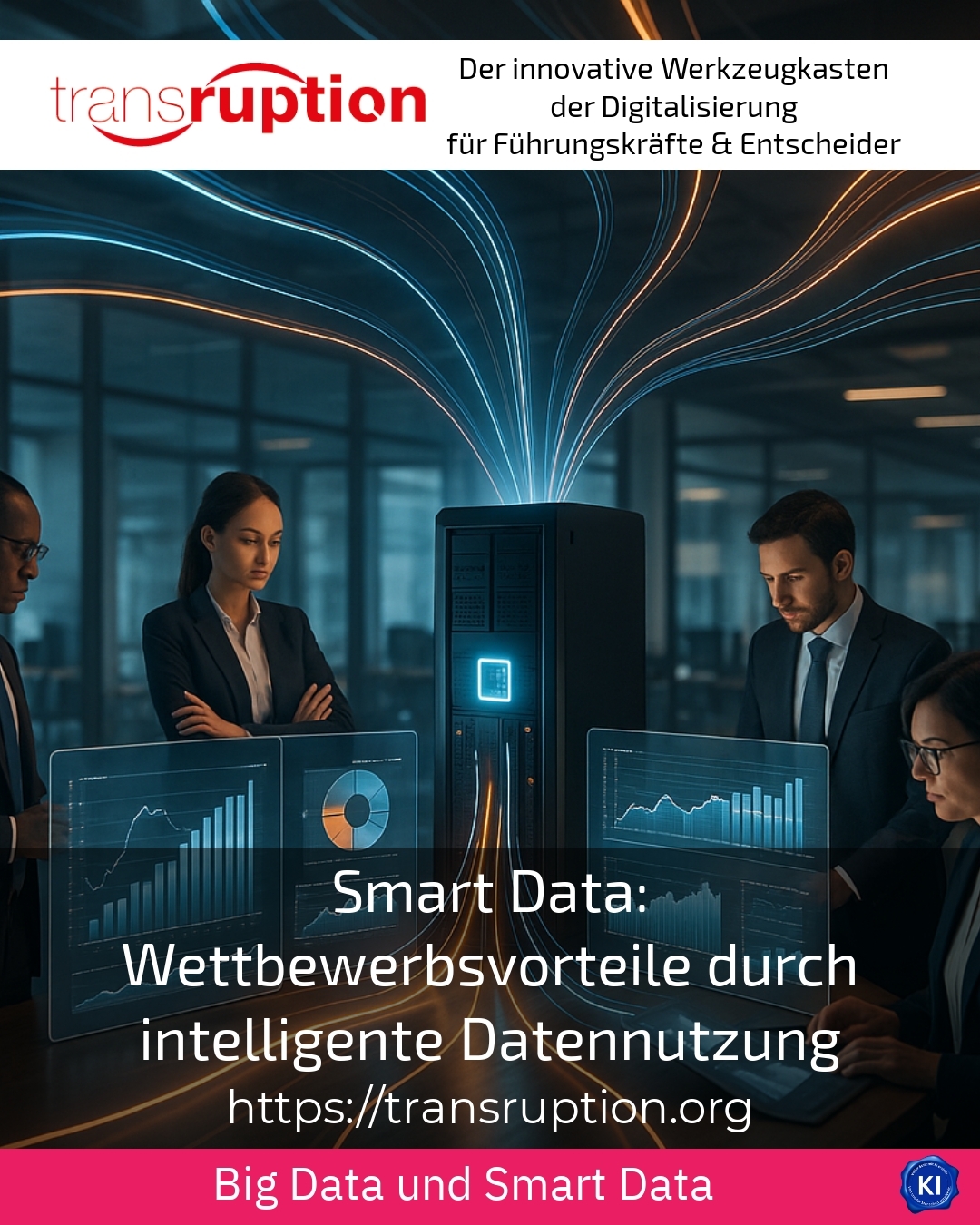Smart data opens up new perspectives for companies for the intelligent utilisation of information and helps them to achieve sustainable competitive advantages. This intelligently prepared data not only makes it possible to search through large amounts of data, but also to gain targeted, relevant insights that help in the management of projects and strategic decisions.
Smart data: the basis for differentiated competitive advantages
In today's market environment, companies are faced with the challenge of filtering out the data that offers real added value from a flood of information. Smart data supports this task by taking data quality, relevance and context into account. This turns raw data into a valuable resource. For example, a manufacturing company can use smart data to utilise sensor data acquisition to precisely plan machine maintenance and reduce unplanned downtime. An energy supplier, on the other hand, analyses consumption data smartly in order to control grids more efficiently and better integrate renewable resources. A retail chain also benefits when customer data is read out smartly and regional characteristics are taken into account in advertising campaigns.
The targeted use of smart data enables companies to better customise products and services to customer needs and streamline operational processes. This not only saves costs, but also increases customer satisfaction and loyalty. Insurers, for example, use smart data to assess risks more accurately and develop individualised offers. A telecommunications provider can use smart analyses to proactively expand network capacities based on real-time network usage data and customer feedback. Smart data also helps the healthcare sector to develop personalised therapies by bringing together patient data in the right context.
Practical implementation and application of smart data in companies
The implementation of smart data requires careful data curation and the use of modern technologies such as artificial intelligence or machine learning. For example, retail companies can use an intelligent platform to collate all relevant sales figures, market trends and customer opinions in order to react dynamically to changing demand. HR managers in large organisations use smart analyses to identify employee motivation and fluctuation risks at an early stage and take countermeasures. Logistics service providers are also using smart data to gain insights into supply chain bottlenecks and optimise routes in real time.
BEST PRACTICE at the customer (name hidden due to NDA contract) An industrial company increased the efficiency of its maintenance planning by 20 per cent with the help of smart data. The intelligent analysis of machine data made it possible to customise maintenance intervals and significantly reduce downtimes, which led to a considerable reduction in costs.
BEST PRACTICE at the customer (name hidden due to NDA contract) In the retail sector, smart data has made it possible to target customers more precisely. Data analyses were used to segment purchasing behaviour and preferences, which allowed for personalised marketing campaigns and better control of stock levels. Customers report a more personalised shopping experience.
BEST PRACTICE at the customer (name hidden due to NDA contract) An energy supplier developed a flexible load management system with the help of smart data analyses. The company reacted to consumption peaks and focussed on sustainable energy in order to reduce costs and act ecologically. Acceptance among customers increased significantly.
Tips for the successful integration of smart data
To fully utilise the benefits of smart data, companies should consider the following points:
- Select data sources carefully and check their quality to ensure reliable analyses.
- Ensure good data integration so that different systems such as ERP, CRM or IoT platforms can bundle their information.
- Enable employees to use smart data tools and make data-based decisions.
- Create a flexible, scalable IT infrastructure that supports growth and new use cases.
- Take data protection and compliance into account from the outset in order to strengthen trust with customers and partners.
Smart data as the key to agile and sustainable corporate management
In addition to increasing efficiency and customer focus, smart data also opens up opportunities for sustainable business. In the area of corporate social responsibility, intelligent data utilisation allows resource consumption and CO2 emissions to be measured precisely. This can be seen, for example, in companies that use smart data to improve their building intelligence and thus adjust their energy consumption in real time. Or in the optimisation of logistics processes - fewer empty runs, fewer emissions.
Smart data can also support collaboration on transformative projects: Managers receive data insights to manage change in a targeted manner and minimise risks. Clients often report that they have been able to react more agilely to market changes thanks to such data-based impulses. This not only creates economic benefits, but also security in dynamic markets.
My analysis
Smart data offers companies a wide range of opportunities to position themselves differently in the market through the intelligent use of data. The systematic preparation and analysis of relevant data facilitates well-founded decisions and optimises processes. Particularly in industries with high data volumes or complex processes, smart data enables new business models and sustainable economic activity. Smart data is therefore far more than just a technical trend - it is a strategic success factor for forward-looking companies and a valuable support for projects that want to utilise data intelligence.
Further links from the text above:
[1] What is smart data? Definition, application and advantages
[2] Smart data and IoT - GISA GmbH
[3] Smart data definition: basics and applications
[5] Smart data: How companies can make better decisions
[6] Smart data: the solution for intelligent corporate management
[7] Smart data: How intelligent data is shaping our future
For more information and if you have any questions, please contact Contact us or read more blog posts on the topic TRANSRUPTION here.















